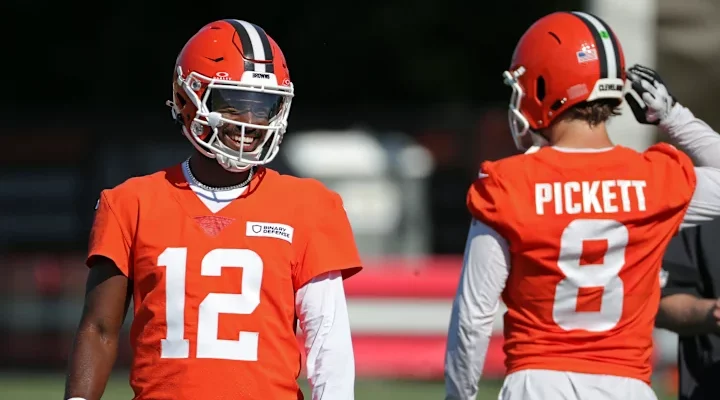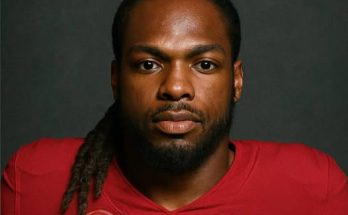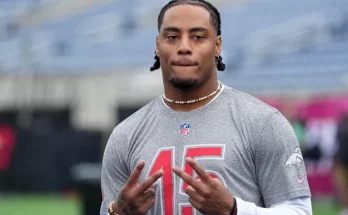Kenny Pickett, the Pittsburgh Steelers’ young quarterback and presumed future of the franchise, has always been known for his poise, competitiveness, and leadership. But as he deals with yet another injury setback, Pickett finds himself in unfamiliar territory — sidelined, frustrated, and itching to get back on the field. The former first-round draft pick recently opened up about the emotional toll of being out of action and his burning desire to return to the game “as fast as possible.” For Pickett, this isn’t just about physical recovery — it’s about proving to himself, his teammates, and the entire NFL that he can weather adversity and lead his team with the same fire and resilience that carried him to prominence at the University of Pittsburgh and into the pros.
The injury, whose specifics the team has kept relatively quiet, came at a time when the Steelers were looking to find momentum in their offense. It’s not the first time Pickett has had to deal with physical setbacks in his early career, but this one seems to have struck a deeper nerve. Perhaps it’s because expectations are higher, or maybe because this was supposed to be his breakout year. Regardless, Pickett’s tone in recent interviews has made one thing abundantly clear: he is not comfortable on the sideline. The look in his eyes, the intensity in his voice, and the drive behind every rehab session signal a player unwilling to let circumstances define him.
Pickett described the experience as “frustrating,” and not simply due to the pain or the fact that he can’t participate fully in practice. What truly grates on him is the inability to lead — to be in the huddle, command the offense, and feel the pulse of the game in real time. That absence can weigh heavily on any quarterback, but especially one like Pickett, who prides himself on being a competitor and tone-setter. When you play quarterback in a football-obsessed city like Pittsburgh, the expectations are relentless, and Pickett has never shied away from them. Now, with his body temporarily failing him, he’s relying on mental toughness, discipline, and hope to power his way back into the spotlight.
The Steelers’ coaching staff, led by the ever-steady Mike Tomlin, have expressed support and confidence in their young signal-caller, emphasizing that they want him back only when he’s truly ready. But Pickett’s own urgency complicates things. He’s said he wants to return “as fast as possible,” a statement that might worry some who fear a rushed comeback could lead to reinjury or hinder long-term development. Still, that urgency is part of what defines him. Whether it was climbing the depth chart in college, elevating Pitt to an ACC title, or asserting himself in Pittsburgh’s quarterback room, Pickett has always played with a chip on his shoulder and a sense of urgency that borders on obsession.
Inside the Steelers’ facility, Pickett remains a vocal presence. Even while recovering, he’s been in team meetings, on the sideline during practices, and active in mentoring backups and engaging with offensive coordinator Arthur Smith on schemes and play adjustments. That level of engagement, even while sidelined, reflects the kind of player and leader Pickett is. He’s not content with just being in the league. He wants to be the reason his team wins. And the frustration he feels isn’t born of selfishness but from a deeply rooted commitment to his team’s success.
The city of Pittsburgh has a long and storied history with quarterbacks. From the iconic days of Terry Bradshaw to the Ben Roethlisberger era that delivered two Super Bowl titles and nearly two decades of competitive football, the quarterback position is sacred ground. When the Steelers selected Pickett in the first round, he wasn’t just another name on the depth chart — he was a symbolic bridge between eras, especially since he played his college ball at Heinz Field, the same stadium where he now dons the black and gold. That legacy weighs heavy on anyone, but Pickett has carried it with quiet confidence. And so, his absence now doesn’t just impact the team’s performance; it stirs emotions among a fan base hungry for stability and greatness under center once again.
Pickett’s rehabilitation is being handled with care by the team’s medical staff, but he’s reportedly pushing himself every day. He’s been seen doing light throwing drills, walking with more fluidity, and staying close to his position coaches. While the team has yet to release a definitive timeline, sources around the league believe Pickett could be back within a few weeks if his recovery continues without setbacks. That said, much will depend on how he feels in live reps and whether his movement and throwing mechanics are unaffected. The coaching staff will also weigh his readiness mentally, ensuring that Pickett’s return isn’t just about the body, but about game speed, decision-making, and command.
Backup quarterbacks have stepped in during Pickett’s absence, but none offer the same upside or chemistry with the offense. The offense has looked out of rhythm at times, and while it’s unfair to pin all struggles on the quarterback change, it’s obvious that Pickett’s leadership and presence are sorely missed. Offensive linemen have spoken about how he inspires confidence in the huddle, how his preparation lifts everyone around him, and how his accountability holds teammates to higher standards. These are intangible traits that don’t show up in stat lines but are invaluable over the course of a season.
There is also an emotional component that fans and analysts shouldn’t overlook. Injuries can rattle confidence, especially in young quarterbacks who are still trying to find their rhythm and identity at the professional level. But Pickett doesn’t seem rattled — just restless. His comments to the media reflect a fierce determination to return better than before. “I’m doing everything I can, every day,” he said. “It’s frustrating, yeah, but I’ve got a job to do. I want to be out there leading my guys.” Those words, though simple, are laced with the kind of fire coaches love to see.
Teammates have rallied around Pickett, too. Several offensive players have mentioned how even from the sidelines, he’s been a motivating force. Wide receivers have shared stories of Pickett breaking down coverage tendencies with them during games, while linemen have noted how he still reviews film with the unit to better understand blitz packages. This level of involvement shows Pickett’s maturity and hints at a bigger truth — that he’s not just trying to get back for his own sake but because he believes his team needs him, and he wants to be the one to shoulder that responsibility.
Fans in Pittsburgh, known for their loyalty and passion, have also thrown their support behind Pickett. Social media has been flooded with messages urging him not to rush, to prioritize his health, and to know the city has his back. It’s a relationship rooted in familiarity — many fans followed his college career at Pitt, cheered as he led them to a title, and celebrated when the Steelers drafted him. Now, as he battles back from injury, the city watches anxiously, hopeful he can resume his journey toward becoming the franchise quarterback they’ve long desired.
There’s a certain poetic quality to Pickett’s path — a player who’s spent nearly his entire football life in Pittsburgh, now tasked with resurrecting a proud franchise. The injury is just a detour, a test of resolve, and if his words and actions are any indication, Pickett is determined not to let this moment define him. In fact, he may very well come out of it stronger — more focused, more experienced, and more in tune with the realities of the NFL.
Football careers are often shaped not just by highlights, but by how players respond to adversity. For Kenny Pickett, this injury is more than a physical hurdle. It’s a challenge to his leadership, his patience, and his ability to remain steady amid chaos. So far, he’s passing that test with flying colors. The fire is still in his eyes, the drive still evident in every rehab step, and the belief — from both Pickett and those around him — remains unshaken. One thing’s for sure: when he does return, expect him to play with even more urgency, more purpose, and with a deeper understanding of what it means to lead a team through both the highs and the lows.



